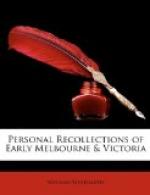EARLY VICTORIAN LEGISLATION.
“They that stand high have many blasts to shake them.” —Richard III.
“Hear ye not the hum of mighty workings.”
—Keats.
“Stay, you imperfect speakers.”
—Macbeth.
We commenced with an unpretending budget, although memorable 1853, with all its gold and its progress, in what Wentworth happily called the precipitation into a nation, had dawned upon us. The Speaker of our then single Chamber system—one-third nominees—had but 400 pounds a year, which is guide sufficient to indicate the scale and style of other things. Our first choice for Speaker fell upon Dr. Palmer, an early colonist of the medical profession, and of good culture and bearing, but who had not previously taken any prominent social position. His ambition was probably stimulated by the fact that amongst the busy colonists, who perhaps foresaw more work than either honour or pay, there was no candidate but himself. The rest of us speculated, not without expected amusement, as to the official attire our new dignitary would appear in. Probably any other of the elected members, as Speaker, would have decided on simple evening dress, as most consistent with the modern tendency to make a gentleman plain, and the waiter and footman dressily conspicuous; and this would perhaps have decided as to “the Chair” in that respect for all the future. But Palmer we all knew to be too much of the old Tory for any surrender of that kind, and there was, besides, just a trace of the oddly positive in him, although otherwise a genial good fellow, which held out promise of sport. We were only half gratified. He appeared in a plain quaker-like but much braided coat, which was understood to have gone for dress in the good old times of Charles II.—a time when kings were really kings.
Three prominent subjects came before us for legislation. First, that fundamental topic of interminable difference, the Land Question. Second, the Goldfields Question, which was even more important then, seeing that the Government, under pretence of old English law, to the effect that all “treasure trove” was the Crown’s, claimed the whole goldfields as Crown territory, whose population had thus no rights, political or fiscal, except the Crown chose to give such. Third, the Transportation Question, which, under the startling emergencies of the moment, was perhaps second to no other before us.
It was rather amusing to see how business went at first, for nearly all of us were quite inexperienced in public life. But Mr. Barker, our first Clerk of the Council, took bravely to his duties, and soon became a useful referee. There was much looking up for authority, and O’Shanassy indulged in many a profane joke at “May” having taken definitive possession of Speaker Palmer’s brain. One most decided obstacle to our legislative progress was the fact that the vast incessant tide of business




